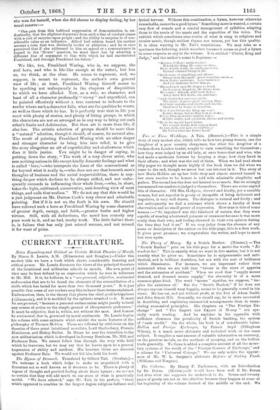The Theory of Money. By a Scotch Banker. (Nimmo.) —
Tho "Scotch Banker" puts on his title-page for a motto the words "Er tenebris lux." This is exactly what we want in this matter, but it is not exactly what he gives us. Sometimes ho is epigrammatic and anti- thetical, and is brilliant doubtless, but not with the sort of brilliance which illuminates. For instance, wo are impressed rather than instructed when wo are told that "labour is the slave of appetite and the automaton of accident." When we read that "supply means demand, and demand means supply," the obscurity is of a more common-place kind. The word "moans " signifies, wo suppose, " im- plies the existence of." But the " Scotch Banker," if ho does not always express himself very happily, seems to be generally sound in his views. He has sat, and not without profit, at the foot of Adam Smith and John Stuart Mill. Generally, we should say, ho is more successful in describing and explaining commercial arrangements than in enun- ciating economical principles. His chapters on "The Foreign Ex- change " and " The Import and Export of Money " are spe-
cially worth reading. And he explains in his appendix with sufficient clearness the peculiarity of Scotch banking, the system of "cash credit." On the whole, his book is of considerable value. Bullion and Foreign Exchanges, by Ernest Seyd (Effingham Wilson), is a much more elaborate and technical work on the same subject. It supplies a vast amount of valuable information on currency, on the precious metals, on tho methods of assaying, and on the bullion trade generally. To these is added a complete account of all the mone- tary systems of the world, of the " Foreign Courses of Exchange," and a scheme for " Universal Coinage." We can only notice the appear- ance of Mr. W. L. Sargant's elaborate Defence of Sinking l'unds (Williams and Norgato).






























 Previous page
Previous page